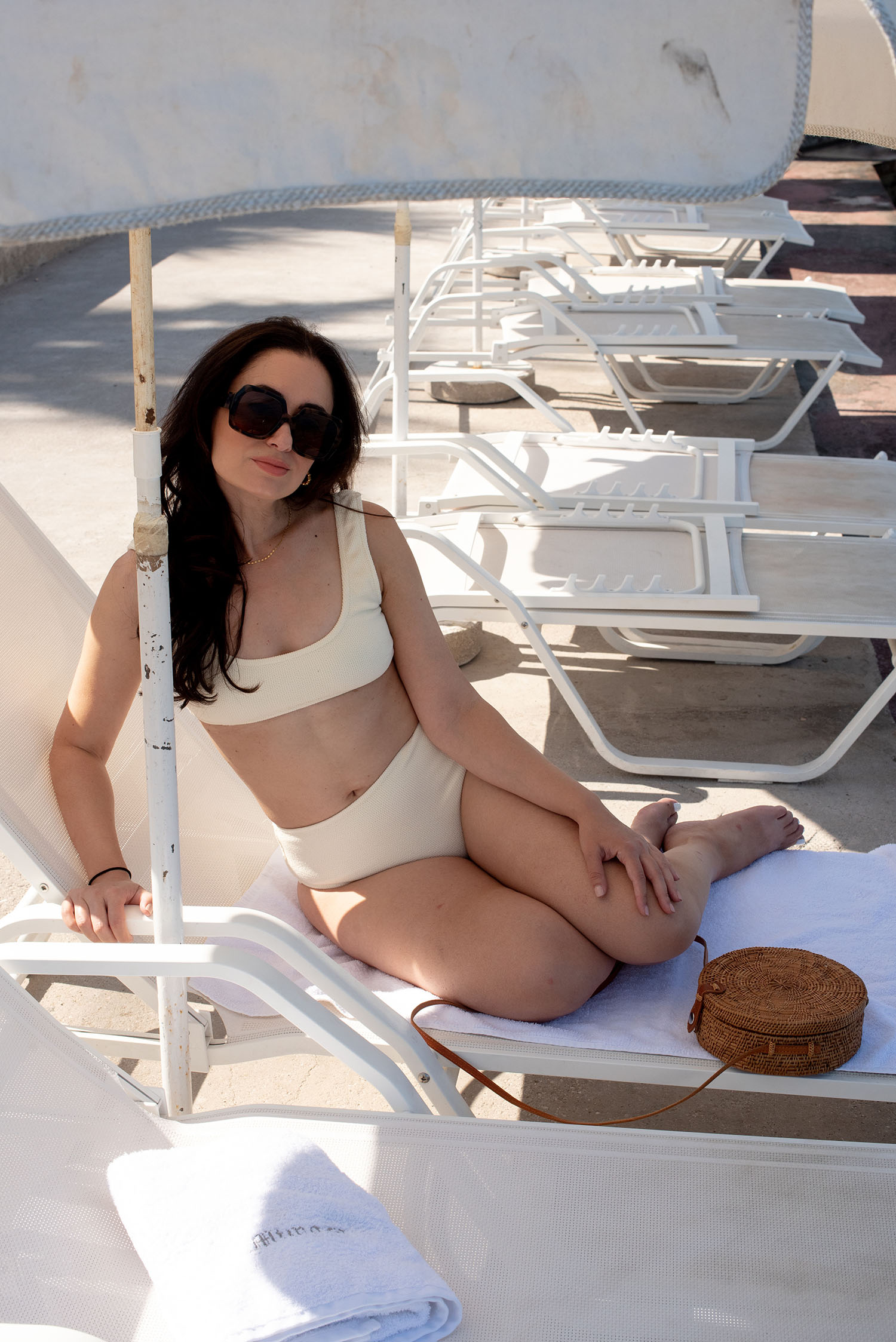
Zara Home bikini bottom (similar)
Mango sunglasses
Ellen James handbag
Havaianas flip flops
Agape Studio necklace (c/o) (similar)
Agape Studio earrings (c/o) (similar)
Location: Paralia Agios Mamas – Spetses, Greece
The need to talk about Talena Taylor seems urgent now, although until September, I hadn’t thought of her in years. None of you will have heard of her, of course. It seems fitting to bring her up, after all this time, alongside a series of photos like these, whose artifice she would have loathed.
Talena Taylor wasn’t a real person. She was a character in book, one I wrote a long time ago, one that came before the stories about Amaia that many of you know so well. But she was also a powerful force. A raw and unfiltered teenager girl who was astonishingly angry because she was deeply sad. A Creative Writing assignment in eleventh grade turned deeply personal that garnered not just a perfect grade but won a silver medal in the Scholastic National Art and Writing Awards while simultaneously insulting many people, including my school principal, because it told just too much of the truth, and ultimately (but not directly) got me kicked out of the valedictorian race, even though I was number one in our graduating class.
Tal was a lot.
She was my feelings, in eleventh grade. A smart girl spinning her wheels, surrounded by, and trapped with, people she perceived to be morons. She’d been manipulated and sexually violated; life forced her to co-exist with her aggressor daily while her clueless teachers told her she was the problem and her distracted parents were too busy to notice there was a problem at all. It was all fiction, and so was she, but it was a transparent exaggeration of my truth at the time I wrote it. I poured an incredible amount of heartache into her story, Talena Taylor Has Entered the Building. She said all the awful things I wish I could but knew I would someday regret if they actually came from me.
She wasn’t very original – Tori Spring, a character in a series of Alice Oseman novels out now, is a carbon copy of her. But that’s because I wasn’t really, either. Sometimes, she was outrageously funny, like when she said eyeliner was Seth Maguire’s best friend but he was just using it. That was me, too.
Around the time of the valedictorian race fiasco, I was in informal talk with Scholastic about actually publishing Talena Taylor Has Entered the Building. It never happened. At the time, it was a disappointment, but a relatively minor one. The idea that anyone would really want to publish my novel seemed unbelievable, even to me. I moved on pretty quickly.
And when I look back now – what a relief. I can just picture it: Tal could so easily taken the world by storm. She wasn’t original, but she was way ahead of her time in 2003. I was only seventeen. The life that would have ensued was my dream back then, but I can’t imagine it as a happy one. To be critically acclaimed for writing young adult fiction would have meant an obligation to continue writing the same thing to maintain a fanbase. Writing popular books would have been my career, which would have meant that my personal growth couldn’t impact my work. Maybe there would have been a whole Talena Taylor series.
The prospect of it makes me shudder now. Even if, eventually, I could have left her behind and moved on to writing for adults, or to a different career entirely, in this hypothetical future, she would have a life of her own. And she would be the start of every conversation with every person I ever met. “You wrote that book! I loved it so much was I was younger.” But also, “That’s your book? I never could figure out why people loved it so much…”
There are some stories we need to write. But that doesn’t mean they’re meant to be told.
Tal was how I coped at a terrible time in my life that I’m just now figuring out how to fully process. When I couldn’t speak up for myself, she expressed that I felt I’d been taken advantage of. That the people around me dismissed what happened as teenaged nonsense unfairly. And that accepting both of those things to keep up appearances was more important than how I actually felt. I needed to express those ideas, but without saying those things, because saying them would have meant opening myself up to all kinds of consequences I wasn’t ready for yet. I’m glad I had Talena Taylor to allow me to do that. I’m also immeasurably glad that I haven’t lived the rest of my life with her words bound into paperback and on sale in book shops. They were just fiction.